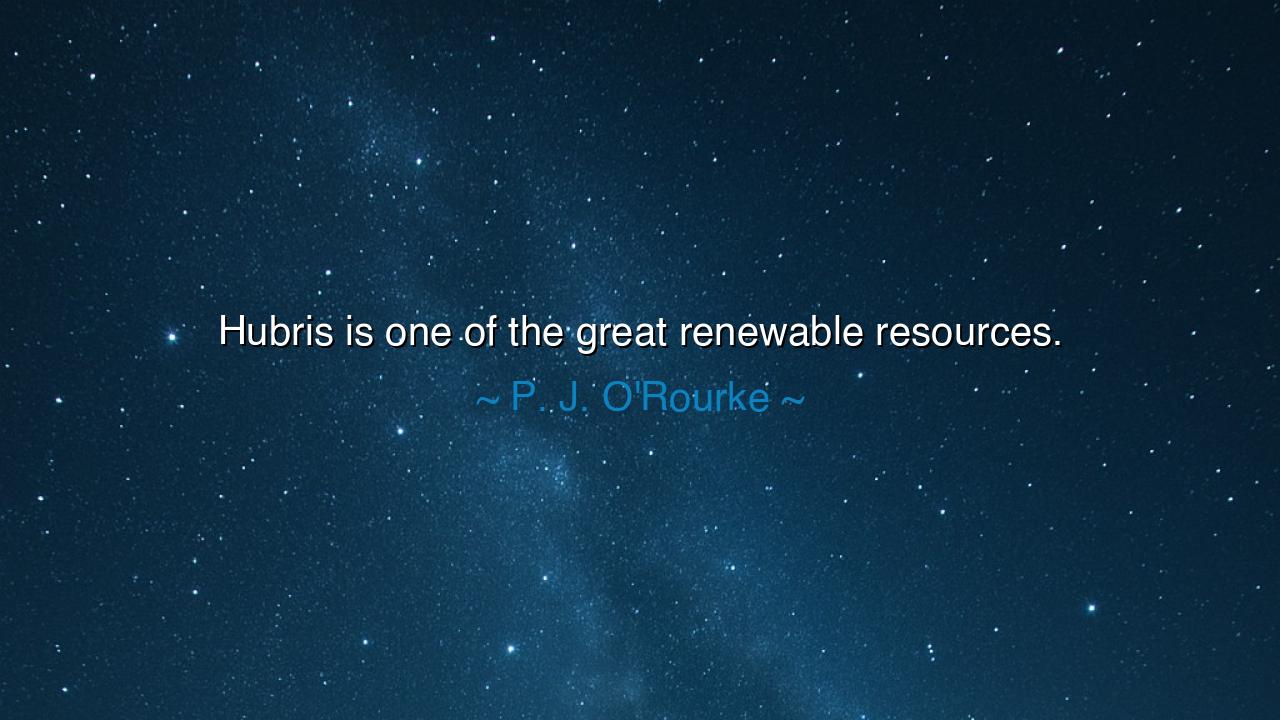
Hubris is one of the great renewable resources.






"There is no limit," wrote P. J. O’Rourke, “to the arrogance that mankind can regenerate.” In his biting humor and sharp observation, he declared: “Hubris is one of the great renewable resources.” Behind this jest lies a truth as old as civilization — that human pride, once thought vanquished, always rises again, like weeds after rain. The ancients called it hubris, the arrogance of mortals who believe themselves equal to the gods, immune to fate, and wiser than the laws that govern all things. It is the fire that builds empires — and the spark that burns them to ash.
From the dawn of history, hubris has danced with humanity. The Greeks spoke of it as a sacred warning: to defy moderation, to exalt the self beyond its measure, was to summon Nemesis, the goddess of retribution. The tale of Icarus, who soared too close to the sun on wings of wax, stands as the eternal parable of pride untempered by wisdom. He knew the limits, yet in his exultation, he believed himself beyond them — and so fell, like every proud man before and after him.
O’Rourke’s words carry the echo of these ancient warnings, clothed in the wit of a modern age. He saw that though we advance in science and reason, our vanity evolves alongside our inventions. Every generation declares itself enlightened, wiser than the last — and yet, each repeats the same folly in a new form. We build towers not of stone, but of technology; we conquer not kingdoms, but markets; and in each triumph, the whisper of hubris returns: “You are invincible.” Thus, it renews itself endlessly, as though pride were written into the code of our creation.
Consider the Titanic, that grand ship of human ingenuity. “Unsinkable,” they said — the very word dripped with pride. But the sea has no regard for man’s boasting. One iceberg, one moment of arrogance, and the great marvel became a grave. Yet the lesson faded quickly; soon the same spirit of overconfidence filled new arenas — the sky, the atom, the screen. Again and again, mankind believes it has mastered the world, and again the world reminds him otherwise.
But let us not despise hubris entirely, for it is both curse and catalyst. The same pride that blinds also drives — it compels man to reach for the stars, to dream beyond his station. The key is not to kill it, but to govern it — to temper ambition with humility, courage with conscience. The Greeks called this harmony sophrosyne — self-restraint, balance, wisdom of measure. Without it, pride devours the soul; with it, pride becomes purpose.
In the world of politics and power, O’Rourke’s satire struck deep. He watched leaders and nations stumble not from ignorance, but from overconfidence — the belief that they could reshape the world by sheer will. It is not lack of knowledge that ruins empires, but the refusal to see their own limits. History, he implies, is a wheel turning on the same axis of pride. Every fall of Rome, every broken republic, every financial collapse begins with the same delusion: “This time, we are different.”
So, my friend, take this teaching into your heart. Beware of hubris, even in small things. When you succeed, bow your head in gratitude. When you rise, remember how easy it is to fall. Do not mistake confidence for omnipotence, nor success for immortality. For hubris may indeed be a renewable resource — but humility must be your shield against its endless return.
And if ever you forget, look to the ruins of those who came before — to Icarus in the sea, to the towers that crumbled, to the voices of kings who once said, “I cannot fail.” The wind still carries their echoes, whispering through time: “Remember your place beneath the heavens.”






AAdministratorAdministrator
Welcome, honored guests. Please leave a comment, we will respond soon